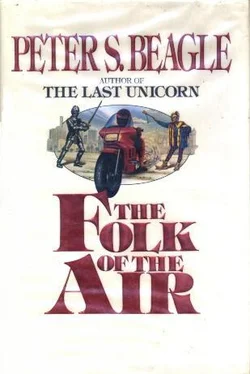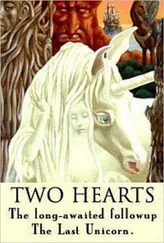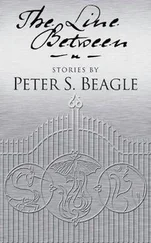Farrell put the carving down as Sia came back, followed by a short man in a dirty overcoat. She passed the doorway quickly, pausing only to say, “Tell Ben I am with a client.” Her face was flushed and angry; it made her look young. The man peered into the room and flinched from the sight of him, from the sight of everything, as Farrell had once seen a hospital patient recoil, one who had been so badly burned that the least stirring of the air around her was a firestorm. The man was no taller than Sia, but his shoulders were almost grotesquely wide and thick, and he walked with an awkward, flat-footed stamp, like a hawk on the ground. Farrell had a glimpse of an overshot, downturning mouth under a stiff yellow moustache, of pale reddish skin, and of small yellow eyes vague with terror.
The Le Roy was an unsalvageable shambles by now, and the Robinson fantasia that Farrell tried next came out equally as muddy. He gave up on tunes for the evening and went back to sixteenth-century finger exercises. They gave him the comfort of doing something fluently and room to think about the short man and the other frightened people who came to visit Sia.
She always referred to them as her clients—there was no surer way to anger her than by calling them patients. Farrell had rather expected them all to be pouty undergraduates, but they turned out to range from lawyers to parking-lot attendants, from a dance instructor to a paramedic to a retired policeman. A few seemed almost as withdrawn as Suzy McManus; most passed Farrell on the stair in a smiling frenzy of control. The night visit was in itself no surprise; Sia kept office hours of a sort, but Farrell had quickly grown used to the voices in the next room, crossing each other from all sides of his sleep—Sia talking in her voice that always made him dream of the ocean, the seabird misery of the travel agent, and the headwaiter’s hoarse complaining. Farrell could tell them apart in his sleep, by sound, if not by sorrow.
Now, plinking his thirds and fifths and listening to the sound of the yellow-eyed man’s voice, he knew that he had never heard it before. It was deep and slow, almost drawling, and it spoke English with a sprung, halting rhythm that put a dance step in the middle of the few recognizable words and made them stumble over weak vowels at the end. And Sia’s voice, when she answered was full of the same limping music, as powerfully soothing as the man’s was fear-tattered, but no more comprehensible to Farrell, nor less disquieting. He changed his mind about tunes, and began on Mounsiers Almaine as brightly as he could; but the lute voice in his lap sounded to him now like a third stranger singing upstairs.
From that evening, he gave up actively looking for a place of his own. He began to pay for his board, inventing an amusing new name and reason for the payment each week; and he took over, little by little, such chores as walking Briseis in the evening. The Alsatian had fallen distractedly in love with him and would sleep nowhere else but across his feet. He continued to bring home imported delicacies around the end of the week, to cook dinners occasionally and swim with Ben, and to stay out of the way with a gracefulness that made Sia smile. At night he helped Ben massacre slugs and snails in the garden, convinced that he could hear the windows snickering behind him as they winked on and off. The house itself increasingly lured and alarmed him; certain small rooms upstairs also seemed to come and go entirely as they pleased, and he hung his clothes and stacked clean sheets in closets that never stayed quite the same size. He told himself that he was overimaginative and needed glasses, both of which were true. He never saw the yellow-eyed man again.
Now and then he still made a telephone call, or put in a few Saturday hours driving in Madame Schumann-Heink to investigate any advertisements that seemed safely out of the question. He no longer spent his free time studying bulletin boards in shopping centers and coffeehouses, but usually let himself be drawn up to Parnell Street, near the campus, where the sidewalks all but met, looping out in cake-icing swirls to protect fragile shade trees—trees had right of way in Avicenna—and constricting traffic to a single furious lane. There he sat outside a cavernous place called the South Forty, drinking bowls of caffe latte and watching to see whether the costumes were ever coming back.
Farrell had last lived in Avicenna during a time of halfwit marvels; a short-lived season when all imaginings were amill in the streets, wheeling and shrilling and rolling by like constellations. The country girls and the mountain men, the Chakas and Murietas and the innumerable starveling Christs, the double-breasted Cagneys and booted McQueens, the zombies and Rasputins, the pirates, the lamas, the Commanches—they were mostly gone now, leaving behind them, as far as he could see, only a lot of shaggy-styled businessmen, a lot of children named Cosmos and Startraveler, and the occasional clutch of bald, pale, pimply devotees in robes the color of canned tuna. Farrell missed costumes. He had enjoyed playing for them, whatever they concealed.
The strange part is, they were forever running around yelling at people to get naked, to strip off their masks and let the sunshine in on their most secret faces, their true and deadly dangerous and lovely selves. Not me, boy—the more costumes, the better, you want my opinion. Masks on top of masks, images like layers of winter underwear, that’s more like it. Costumes brighten the air, and they still let you get your practicing done. Naked people don’t do either one, hardly ever .
The day that he quit his job at Thumper’s—early spring and a new entree called Hippety Haunches proving an irresistible combination—Farrell spent looking desultorily for construction work and for someone who might be able to build a wooden case for the lute. By five o’clock he had come conditionally to terms with a cheerful Bengali cabinetmaker and he was feeling lazily adventurous and pleased with himself when he wandered down to the South Forty for coffee and baklava, a Holborne tune he had never been able to finger correctly suddenly beginning to explain itself to him.
There never were any empty tables at this time of day. He sat at a table near the door, next to a young man wearing white chinos, Hush-Puppies, and a purple shirt with a map of the Hawaiian islands on it. The sky was full of little shadow-bellied clouds, but the air was honey-warm and seemed to have golden bubbles in it, like honey; and everyone walking on Parnell, from the backpacking Amazons to the tattooed, expectant motorcyclists, moved as lingeringly as if they were journeying through honey, in that hour.
The young man in the Hawaiian shirt had not even turned his head when Farrell sat down at his table; but when Farrell went inside and returned with a glass of water, the young man looked sharply round at him, saying in a hoarse Kentucky voice, “I hope you aren’t planning on drinking that water.” His square, lumpy face was ribbed lightly with acne scars.
“As a matter of fact, I was,” Farrell said. “Got some baklava stuck in my throat.”
The young man shook his head violently and actually moved the glass away from Farrell. “Don’t you do it, sir. That water is poison. That water is nothing but plain poison.”
I still pick them out , Farrell thought. That hasn’t changed, anyway. There could be one Ancient Mariner on the 747, and I’d sit down by him four out of five times, by independent laboratory test . He said “Oh, I know that, but everything’s poison these days. I surrendered way back when they were just painting the oranges.”
“No, don’t give up,” the young man said earnestly. “Look, when you want some water, I’ll tell you the best place to go to. Inverness.”
Читать дальше












